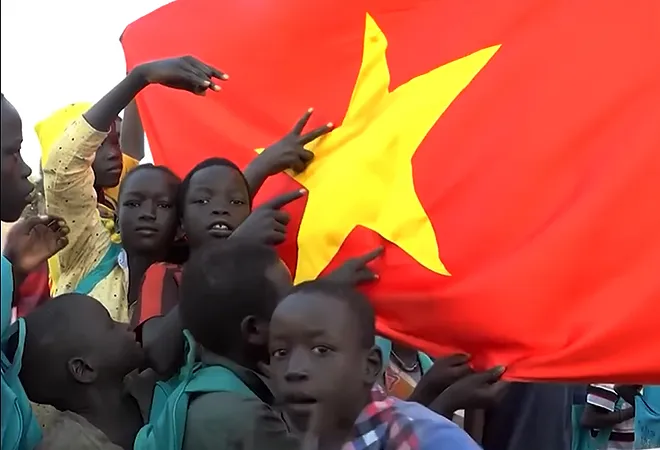 This is the 133rd article in the series–The China Chronicles.
This is the 133rd article in the series–The China Chronicles.
China’s engagement in Africa rarely misses the spotlight. Its role as a development partner tends to evoke a mixed response and is always subjected to public scrutiny. Chinese development finance is one of the major reasons why the African continent has been able to reduce its massive annual US$100 billion infrastructure deficit. From the period of 2000 to 2018, Beijing extended US$148 billion of loans, mostly for infrastructure development across many African countries. But there are growing speculations that China is likely to
cut back on its infrastructure lending to Africa in the post-COVID era amidst mounting debt sustainability concerns.
Chinese creditors are understandably becoming cautious about providing new loans as more countries struggle to repay their debts. The
International Monetary Fund (IMF) notes that there are currently seven African countries that are in debt distress (Chad, the Republic of Congo, Mozambique, Somalia, Sudan, South Sudan, and Zimbabwe). This presents a sombre picture of the future trajectory of Sino-African relations. Yet, there are signs that China is willing to play a positive role in developing countries’ debt restructuring process.
According to AidData, interest-free loans accounted for less than 5 percent of the US$ 843 billion in Chinese loan commitments to 165 governments globally between the period of 2000 to 2017.
In August 2022, Beijing announced its intention to
waive 23 interest-free loans to 17African countries that reached their maturity at the end of 2021. This announcement was certainly welcomed, but interest-free loans make up only a minute portion of China’s lending to Africa. According to
AidData, interest-free loans accounted for less than 5 percent of the US$ 843 billion in Chinese loan commitments to 165 governments globally between the period of 2000 to 2017. Therefore, such debt forgiveness, which China has practised for more than two decades, comes as no surprise.
While Chinese debt in Africa continues to be extensively scrutinised in the media, another aspect of China’s engagement in Africa is equally intriguing for observers: Beijing’s ideological and political influence activities. This takes place in various forms ranging from political party training, training media elites, and engaging with the diplomatic corps, to securing access to strategic information and resources.
A brief history of CCP in Sub-Saharan Africa
During the decolonisation period when African countries started attaining independence, China wanted to develop relations with most African countries. However, cutting diplomatic ties with Taiwan was a precondition for developing ties with China. Until Mao Zedong’s death in 1976, the Chinese Communist Party (CCP) tended to establish party-to-party ties only with left-leaning liberation movements and African Communist parties. At that time, these parties tended to be mostly opposition rather than ruling parties.
Since the beginning of China’s reform era, especially from 1990 onwards, the CCP began to change its strategy. Now, two discernible trends of CCP’s engagement in Africa became visible. Firstly, the CCP preferred to engage with African countries that matter to the Chinese economy. Secondly, as opposed to the policy earlier, the CCP now preferred to engage with their ruling parties rather than opposition parties. In addition to sidelining Taiwan, most of Chinese efforts in Africa are focused on extracting mineral resources, increasing market access, and enhancing its overall influence on the continent.
The CCP also focuses its efforts on cultivating closer ties with local ethnic Chinese communities in Africa whose numbers increased significantly during the decade of 2000.
For that purpose, the CCP-International Liaison Department (CCP-ILD), the bureaucracy whose primary job is to maintain and promote party-to-party relations, significantly increased its engagement with Sub-Saharan African political parties. They invited local party officials to undertake “study tours”, follow training sessions, or attend seminars in China. Such activities facilitate the access of the Chinese government to the African political elites, create additional channels of communication, and provide an opportunity to leverage its own domestic economic “success story” to export the CCP’s governance, management, and administrative systems.
The CCP also focuses its efforts on cultivating closer ties with local ethnic Chinese communities in Africa whose numbers increased significantly during the decade of 2000. Today, Chinese communities now residing in the continent are diverse whether in terms of their profession (miners, railway and construction workers, medical personnel, teachers) or their geographic origins (including Guangdong, Fujian, Zhejiang, and Jiangsu). They tend to play the role of crucial “bridges” to facilitate the development of China-Africa relations and shape a positive image of China.
CCP’s methods to exert political influence
In Africa, the Chinese government and CCP continue to promote their own political system and criticise the weakness of “western” democracy. To reach these goals, they employ five distinct methods as laid down by Jean-Pierre Cabestan in an article for a report titled “
Political Front Lines: China’s Pursuit of Influence in Africa”
- Visits: From the decade of 2000 onwards, the CCP-ILD has regularly sent delegations to Africa. However, in present times, they tend to invest more resources in offering African political parties and officials’ free trips to China. Most of these visits take place from African countries that are deemed useful for furthering China’s economic development. Examples include countries like South Africa (boasting ores, iron, copper, diamonds), Congo, Angola, Sudan and South Sudan (oil), Mozambique (timber), and Zambia (copper).
- Study Tours: Free study tours and visits of party cadres from African countries to China are also a regular feature of CCP’s diplomatic efforts to gain influence in the continent. These study tours often involve attending lectures at Chinese universities and field trips to Chinese provinces. Such tours allow China to showcase the strides it has made towards poverty alleviation and the economic development strategies it has employed.
- Seminars: Regular seminars are a convenient method for the CCP-ILD to promote the party’s top-down organisation and China’s method of governance. These seminars are organised around various themes ranging from governance, civil-military relations, poverty alleviation, party organisation, capacity building, and Marxist thought, to topics of internet censorship and surveillance.
- Training: The CCP engages directly with African political parties and leaders to propagate the idea that Beijing’s economic progress over the last couple of decades is attributed primarily to its political system. The training sessions are an extension of the seminars and are conducted for a week or two. The priority training targets of the CCP-ILD in Africa are strategically chosen. Particular emphasis has been placed on South Africa’s African National Congress (ANC), Ethiopia’s EPRDF or the New Prosperity Party since 2019, as well as ruling parties of important economic partners and oil suppliers, such as South Sudan.
In 2020, Chinese Foreign Minister Wang Yi pointed out that China “provided 120,000 government scholarships to African countries and set up 61 Confucius Institutes and 44 Confucius Classrooms in collaboration with 46 African countries.” This illustrates the importance the CCP places on shaping how young African elites’ view China’s government system.
- Equipment: The CCP’s training of African party officials does not only take place in China. There are recent examples which suggest the party is trying to influence training programs in Africa itself. In July 2018, six ruling parties of Southern Africa (the ANC, FRELIMO, CCM, SWAPO, ZANU-PF and MPLA) with financial support from the CCP-ILD (around US$40 million), laid the foundation for the Mwalimu Julius Nyerere Leadership School in Kibaha, Tanzania. The school’s construction was completed in February and it was inaugurated in June 2022. This is another example of the CCP-ILD’s activism in Africa and its efforts to enhance China’s political influence across the continent.
How successful are CCP’s influence activities in Africa?
The CCP’s political influence activities in the continent have to a large extent been successful in bringing key African elites into its network of friends and creating narratives favourable to China and the CCP. This exercise is important as the West is going through a crisis of credibility in Africa in the aftermath of the ‘Vaccine Apartheid’ and Russia’s invasion of Ukraine. Countries such as China and Russia are exploiting this power vacuum and rapidly expanding their financial and political influence across Africa.
The dedicated efforts of the CCP in increasing party-to-party linkages with African political parties have, indeed, led to enhancing Beijing’s diplomatic heft in the continent.
Measuring the success of China’s influence activities in Africa, or in any part of the world, is a complicated task. The dedicated efforts of the CCP in increasing party-to-party linkages with African political parties have, indeed, led to enhancing Beijing’s diplomatic heft in the continent. However, it is not ideology that has brought Chinese and African elites closer to each other. Much of Beijing’s success could be attributed to money and largess, i.e., the CCP’s ability to mobilise large sums of money to deepen its political influence.
Another factor to take into account is what author Lina Benabdallah in her book “
Shaping the Future of Power: Knowledge Production and Network Building in China-Africa Relations”, explores, i.e., the integrated role of social relations, knowledge production and power in China’s foreign relations. Rather than measuring political influence only through material aspects like infrastructure, military bases, ports, highways, or the number of loans or FDI’s, it is important to highlight the investments that China has made into developing a dense and robust network of people-to-people linkages and human resource development in China-Africa relations. The CCP’s political influence activities through party-to-party relations, business, trade, media and university networks, and study tours and training programmes have gone a long way in distinguishing China as one of Africa’s closest developmental partners.
The views expressed above belong to the author(s). ORF research and analyses now available on Telegram! Click here to access our curated content — blogs, longforms and interviews.



 This is the 133rd article in the series–
This is the 133rd article in the series– PREV
PREV


